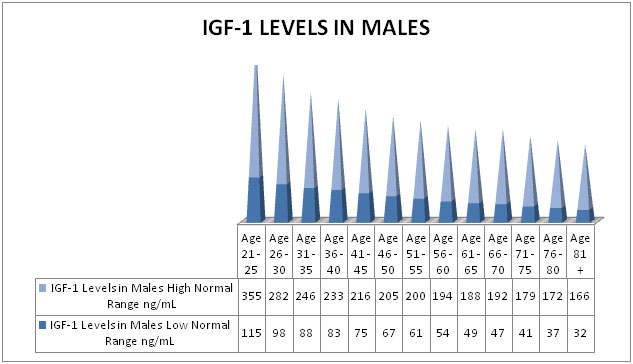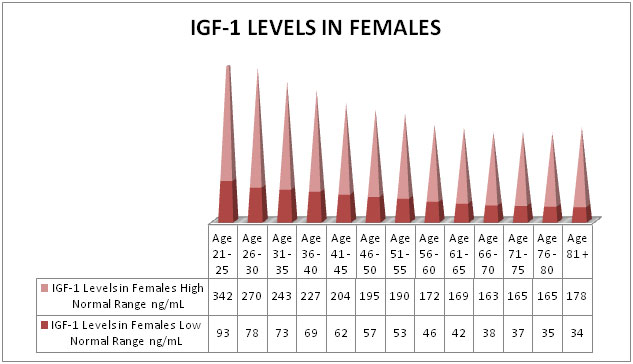Growth Hormone Levels Chart
 Growth hormone deficiency is a condition missed by many general physicians because they have little (or no) training in hormone levels and imbalances. Although they have access to lab results such as the ones shown in the growth hormone levels chart in each of the following two sections, most doctors prefer to send their patients to specialists trained in the field of hormone replacement when symptoms of hormonal imbalance are present, and no other medical cause is detected. A diagnosis of GH deficiency is based on more than just lab results, although that is a large part of the process.
Common symptoms of low GH levels include:
Growth hormone deficiency is a condition missed by many general physicians because they have little (or no) training in hormone levels and imbalances. Although they have access to lab results such as the ones shown in the growth hormone levels chart in each of the following two sections, most doctors prefer to send their patients to specialists trained in the field of hormone replacement when symptoms of hormonal imbalance are present, and no other medical cause is detected. A diagnosis of GH deficiency is based on more than just lab results, although that is a large part of the process.
Common symptoms of low GH levels include:
- Fatigue
- Weight gain
- Low libido
- Premature aging
- Muscle and bone decline
- Frequent illness
HGH Levels in Men
Diagnosing low HGH levels in males begins with an examination of symptoms and lifestyle habits. Poor sleep, lack of exercise, improper nutrition, illness, medications, and high stress can all affect growth hormone production. Men with low growth hormone levels often notice some of the following symptoms:- Lack of energy
- Depression
- Loss of bone and muscle mass
- Increased belly fat
- Erectile dysfunction
- Low sex drive
- Impaired immunity
- Reduced drive and productivity
- Hair loss or thinning
- Aging skin
- Trouble seeing clearly at night

Growth Hormone Levels in Women
Assessing growth hormone deficiency in females is essentially the same as with males. A close look at symptoms and overall health is necessary to determine which blood tests will best provide the needed answers. Because GH decline also mimics low testosterone, progesterone deficiency, anemia, estrogen dominance, and other health issues, it is imperative that the specialist rule out other medical problems at the same time as diagnosing low GH levels. Many women with growth hormone deficiency feel as though they are aging faster than their friends. Thinning hair and increased wrinkles add to this effect. Muscle weakness, bodily stiffness and pain, frequent colds, low libido, vaginal dryness, sensitivity to changes in temperature, mood swings, and depression are typical complaints. The HGH levels chart below measures a woman’s IGF-1 levels at different ages: At Kingsberg Medical, our doctors are specialists in the field of hormone replacement therapy. They test for and treat a range of different hormonal imbalances. To find out more about arranging for your personal blood test at a local lab, please contact our clinic for a confidential consultation at no cost.
At Kingsberg Medical, our doctors are specialists in the field of hormone replacement therapy. They test for and treat a range of different hormonal imbalances. To find out more about arranging for your personal blood test at a local lab, please contact our clinic for a confidential consultation at no cost.
Get Started




















